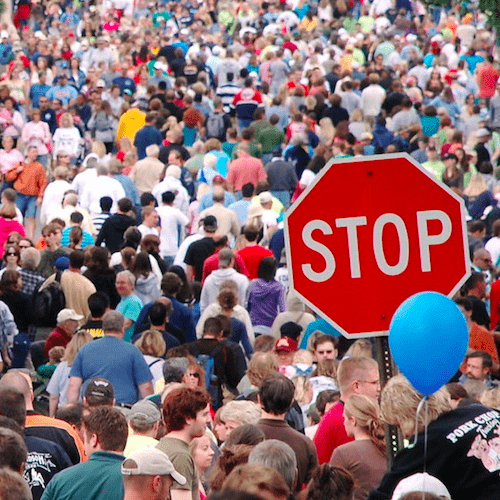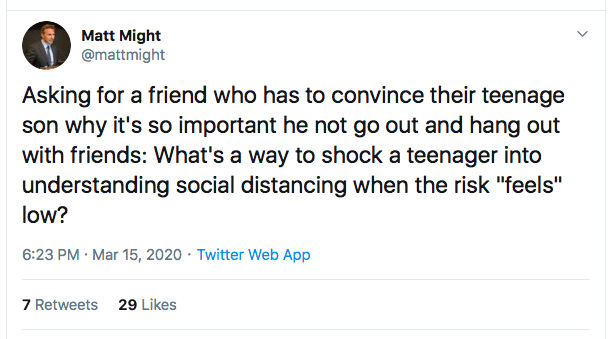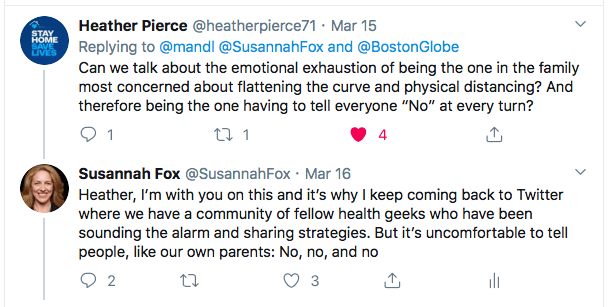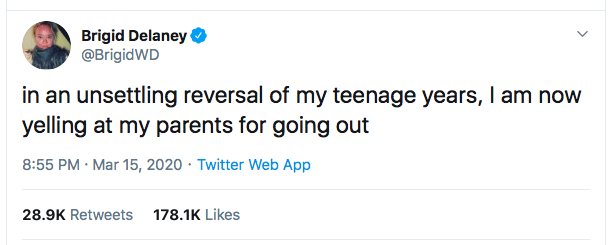
A community colleague wrote:
Our neighborhood list serve has all sorts of ‘advice’. I’ll spare you:)
Are you able to assess how peer-to-peer exchange is playing out with all of this?
In the spirit of Public Q&A, I invite readers to join me in responding:
Yes. I’m seeing a ton of peer-to-peer exchanges of information, which I think is positive because we need EVERYONE to help stop the spread of this virus. Scientists and clinicians are on the front lines, but we all play a role in shaming, shocking, bullying convincing loved ones to stay home.
Italians are attempting to warn Americans in this video (addressing their “10 days ago” selves as a way to spark recognition in viewers of their own doubting, complacent, defiant ways):
I’ve also seen some ad hoc crowdsourcing online. For example, Matt Might tweeted a question on behalf of a parent of a teen who wants to go out:

The responses were thoughtful, offering a wide range of possible approaches, which is useful since every kid is different AND a parent may need multiple arguments to make their point.
ZDoggMD (aka Zubin Damania, MD) modeled how to talk about COVID19 with a middle-schooler — his own daughter:
There is always a possibility of misinformation spreading in networks. Rachel Martens wrote a blog post about how she is approaching the role of peer educator and fact-checker. I love this paragraph and hope that you’ll click through to read the rest of her excellent post:
I’ve had a number of opportunities lately where I’ve been approached by parents of medically complex children. Many of the practices the world around us is recently learning about like “social distancing” are things we adopt on a regular basis to protect our kids. Yet in the spaces we often dwell in on social media, it can become increasingly frustrating to see the ongoing battle when it comes to misinformation. I was asked by a few people about writing about how we can improve the dialogue as parents and ensure that everyone comes at knowledge acquisition from an accurate place. It can be hard to know how to educate and encourage someone to see life from a different lens when what people say on the internet makes you rage internally. Everyone wants to feel empowered, but this is a stressful time that can show prime examples of something called “cognitive bias”.
– Rachel Martens, #SciComm Like a Mother
Playing the role of community fact-checker and peer-educator can be exhausting. Heather Pierce put it well in her tweet:

And Brigid Delaney’s tweet hit a nerve with a lot of people:

Some of the replies made me laugh out loud, both in horror and recognition of my own elder family members’ exploits:
“My sister and I had a phone call about trying to stop mum from going to a party on Saturday. Karma.”
“I went over to check on my mother and found she wasn’t there after she had been told to stay in by everyone and had no need to go out, I ended up sitting at the kitchen table and when she arrived back I said ‘And where do you think you’ve been?'”
“Had to forbid my 86 yo mother from working out with her trainer at the local gym.”
“My mum went dragon boating in Tasmania on the weekend after I specifically said not to.”
OK, that last one is far more adventurous than what my family members are doing, but still.
This is the tweet that resonated with me the most because we really are all in this together:
“Thank you for all the replies. I needed this today. It has cheered me up immensely. My mum is 90 and insisting on staying independent.”
Back in December (a million years ago, it seems) Judith Graham wrote an excellent article about how to parent your aging parents when they don’t want help. Personally, I took the advice to heart and began new conversations with elders in my family. I let them know that I was on their side and supportive of their choices, for example, to age in place, but only if they would allow me to help set them up for success. We contacted a home health aide service to begin conversations about how to get help when they need it. Those conversations in January took on some urgency when the COVID19 virus began making news. And now we are in lockdown mode. I am checking in with elders, peers, and teens on a constant rotation, encouraging us all to stay home and stay safe.
Now it’s your turn, readers.
If you need peer advice about something you are dealing with, drop a comment below. And please let me know if you see other examples of peer-to-peer connection – positive or negative.
Featured image: A detail of “Crowd” by Amy West on Flickr (captured in 2009).
Parents were tuned in when Covid19 was first announced as spreading in China. They are both former public servants, my mom a former nurse and world travellers. They followed the news and felt early on they needed to be cautious.
Now they are social isolating and coaching friends, family about the importance of doing the same.
My dad has taken the lead in his condo re: effective disinfection practices and even purchased cleaners and hand sanitizers for the building.
They are the opposite of ignoring the recommendations of social isolation.
Our family lived social isolation in a very real well as being cautious with our daughter who had mitochondrial disease. After she received a stem cell transplant, we were in social isolation lockdown for 9 months. We know how hard this is to do, and how important it is for people who are medically fragile.
We can do this.
I love these examples of peer coaching! Your parents will save lives, as will you — if people listen and learn from your expertise. Thank you for sharing.
If you’ve created or know of good resources on COVID-19, or if you work at a hospital or clinic, there’s actually a free platform and content clearinghouse that can be used to find info (like a video or PDF) and e-prescribe it to patients & families, and patient groups.
So if you need to get info out to everyone specific to COPD and COVID-19, you simply make a group, choose or add the video or PDF for that population, and send it. It allows you to see who has viewed/read it. And you can add things like a short 2 minute video intro of yourself, surveys, or knowledge questions.
This Docola platform is free resource and will remain free. Patient experts / e-patients can also add content resources so hospitals and clinics can find and share them as appropriate. You can find it here: https://www.doco.la
And because of COVID-19, the CEO is doing 15 min Zoom webinars this week to demo the platform, add content, and e-prescribe it to patients.
Webinars are March 19th and 20th at 12 Noon ET and 12:30pm ET each day.
https://zoom.us/webinar/register/1515843067174/WN_kF9e33tNRnmUOG6ac_wbnQ
I live in Washington, DC where – I’m sure like other metropolitan areas- many of my peers (20s-30s) are in group housing situations, where let’s say 2-8 adults are living in row houses. Guidance from CDC, WHO, etc. is explicitly addressing “family” structures (parents and children) and formal education/work sectors, but “we” in this demographic are struggling to communicate to co-inhabitants both the authorities’ advisement on social distancing effectively, as well as personal boundaries. These group living situations are complicated, with some residents being able to accommodate work from home policies, some working in sectors that cannot accommodate work from home. Outside of varying working situations, those “in-the-know” on public health are struggling to “restrict” our fellow adult roommates on going out, having friends (or significant others) over in shared living space, and minimizing contact in shared areas (kitchens, bathrooms, living rooms). There’s challenges in being able to logistically accommodate social distancing, as well as communicate the importance of social distancing in these group living situations. We’re having similar challenges to others in this forum having to be the “public health police” in our community with mixed results.
It would be valuable to know how this is handled in densely populated countries that are basically winning against the virus spreading.
It may be that those countries (e.g. Taiwan) are just accustomed to things being tight, and dealing with it, while people in places like the US get really itchy if they’re confined and told to radically tighten the extent of their personal space.
So true. I found the video from Italians in quarantine especially moving. I do wonder how much of this resistance is an “American culture” issue, and I think many of my peers feel squeamish about being perceived as limiting other’s personal freedoms by asking/telling them to distance/quarantine.
https://www.coronavirus.gov/
Thanks, Martin!
Here are two other resources for those looking for facts & visualizations:
https://covid19.oneprofile.info
https://www.goinvo.com/vision/coronavirus/
Being in the age group you’re scolding, I just want to say that my doctor agrees with this: yes, it’s okay to go for a walk. One would not get that impression from reading this post.
https://www.nytimes.com/2020/03/17/style/self-care/is-it-ok-to-go-for-a-walk-coronavirus.html
You may find it appalling from me, but as much as I agree with your point that people need to not be stupid (and do need to be informed NO KIDDING), I think this post is overly harsh. It may be that every adult in your stories is a child who needs such scolding, including your mother, but if not, this came across wrong.
People need to understand how the virus can be transmitted and be DEAD SERIOUS about not enabling that. But “Where do you think you’ve been??” is hardly peer to peer healthcare.
Big cheers to the grocery stores who came up with elder hours – the first hours just after the store’s been sanitized (and nothing’s sold out, woohoo!) and before the less watchful middle generation shows up.
I think it would also help to articulate the dual issues of endangering oneself vs risking being a carrier to strangers. Those of us who have faced death and endured a decade more are keenly aware that someday something will get us, and some of us know how to assess the odds from day to day, from this virus to crossing a street or taking a plane. We don’t want to be bosses around about that. What keeps me far more watchful about this virus, tho, is the awareness that I don’t want to unwittingly be the one who brushes it off on someone else. That’s motivating – being scolded isn’t.
Point taken about the tone of the tweets I included in the post. I did it for laughs in a dark time but I understand that it came off as if I myself think it’s OK to scold an elder in a disrespectful way. No, that is not peer to peer health care.
I asked my mom for permission to talk about how she and I are navigating this uncomfortable, frightening time. I have other elders in my life but I have not asked their permission, so won’t talk about them publicly.
Once my mom and I opened the door to transparency, she agreed that she did not take my early warnings seriously. She went through denial and defiance until, unfortunately, veering into catastrophizing, emailing me, for example, to ask what’s the point in being careful now since she was so reckless and not careful for the last few weeks. She had initially told me she was following protocol but it turns out she had snuck out (her words) over & over again. One last this, one last that. Taking chances she did not need to take.
Again, just speaking personally about my mom and I: We know each other VERY well and that is a boon. We can listen and take each other’s advice despite the fact that I am Felix to her Oscar.
All of this stressful intergenerational care & conversation reminded me to look again at a 2008 book review by Abigail Zuger, M.D. She was writing about “My Mother, Your Mother: Embracing ‘Slow Medicine,’ the Compassionate Approach to Caring for Your Aging Loved Ones,” by Dennis McCullough, M.D.:
“And for a good overall picture of a parent’s condition, a child is well advised to ignore the usual medical and nursing jargon and to focus instead on the sound of the parent’s own voice. ‘No one,’ Dr. McCullough says, “can be a bigger expert on a parent’s voice than a former teenager trained in the same household.'”
He wrote his book long before this pandemic was on the horizon, but I think we should consider his advice carefully. What do YOU hear when you listen to a loved one talk, whether it’s your child, spouse, parent, or friend? Listen to their voice and adjust what information you offer to them.
Some people, like you, Dave, are service-oriented and will be motivated by not wanting to spread the virus. Others will be immune (ahem) to that idea. What information can we share with them? What motivation can be uncovered to get them to stay home?
We need everyone to hit the fast-forward button right now, to skip over the understandable shock and denial stage. What I hoped to do with this post is highlight a few examples, find out who else is struggling with these conversations, and hopefully get some new tips — or simply some fellowship — as we navigate the long slog ahead.
Oh! And I should say that while I’m mostly focused on my mom, I’ve also got two teens (but they are more like me: hand-washing Felixes) and did want to hold space in the conversation for people counseling teens & young adults. If you want to see some disrespectful scolding, check out some of the replies to Matt Might’s tweet. To me, none of that “my house, my rules” stuff is going to work long-term.
There’s an interesting new private group on Facebook (a week old) – Distance Resistance:
A friend in the FHIR community spotted a post there where someone’s creating a self-tracking template:
Someone responded with a printable COVID-19 diary (PDF).
Thanks! Adding these to my new Wakelet collection, COVID19: Peer to peer innovation. Please let me know if you see other examples (or whole categories I’ve missed).
Another ZDogg 7 minutes on not being stupid, including a NEW way: people harassing healthcare providers.
And: don’t be an idiot on the beach on spring break, and hey elders, you can’t keep going out with your lunch group.
Hey all,
Judith Graham of Kaiser Health News spotted my Twitter conversation with Heather Pierce and asked if I’d be willing to be interviewed, along with my mom. We said yes and Graham’s story is now up:
Does Everyone Over 60 Need To Take The Same Coronavirus Precautions?
It’s worth a click.
CNN posted a how-to guide for debunking misinformation peer to peer.
Here’s an intriguing quote:
“The research,” MIT professor David Rand, who studies misinformation, told me, “suggests that people really do want to share only accurate information. … The people on your family group chain, most social media users want to only be sharing stuff that’s accurate.”
Note: CNN only links to its own stories (not very helpful except to their advertising dept) but a search turned up Rand’s Feb. 2019 article, co-written with Gordon Pennycook “Fighting misinformation on social media using crowdsourced judgments of news source quality”.
A quote:
“Perhaps surprisingly, we find that laypeople—on average—are quite good at distinguishing between lower- and higher-quality sources. These results indicate that incorporating the trust ratings of laypeople into social media ranking algorithms may prove an effective intervention against misinformation, fake news, and news content with heavy political bias.”
They co-wrote a New York Times op-ed based on that article and just wrote an update March 24, 2020.
If you want to follow their work: @GordPennycook and @DG_Rand on Twitter.
After sharing what I’d learned so far today on Twitter, I connected with Rand directly, who shared their more recent paper:
“Fighting COVID-19 misinformation on social media:
Experimental evidence for a scalable accuracy nudge intervention”
Here’s a tweet thread summarizing what they found.
And Josh Greenberg shared a link to a special issue of The Canadian Journal of Bioethics:
Health Misinformation and the Power of Narrative Messaging in the Public Sphere